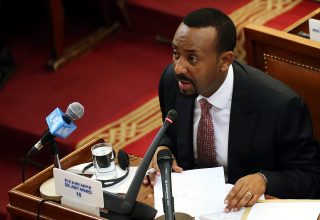A few days ago, Ethiopia’s Prime Minister Abiy Ahmed was awarded the 2019 Nobel Prize for Peace. The Norwegian Nobel Committee found the leader worthy of the award due to ‘his efforts to achieve peace and international cooperation”. Another commendable reason for this dignified recognition was his peace efforts towards resolving the longstanding military stalemate with neighbouring Eritrea.
“By saving a nation of 108 million people from the precipice of an economic and political explosion, he captured the imagination of his own people and people across the African continent as an embodiment of hope,” the letter of nomination read. It also stated that Abiy’s “message of peace, tolerance, and love and understanding are being felt far beyond Ethiopia.”
Rightfully, the PM has been a force to be reckoned with since he assumed office in April 2018, after which he has made several notable reforms. Abiy opened up the political space, appointed a gender-balanced cabinet, released thousands of prisoners and above all, liberalized the once state-run monopolies in Ethiopia.
However, his domestic achievements have also drawn criticism from observers, particularly after winning the Nobel Prize.
In a report by African Business Magazine, critics argue that the prime minister is neglecting serious issues in his backyard in favour of maintaining his positive international image. Ethiopia has one of the highest rates of Internally Displaced Persons (IDPs) in Africa. As at last year, the country was home to 2.9 million IDPs from a total of 28 million new displacements across 148 countries, vastly outstripping neighbouring DRC by over one million people.
This issue is a ticking time bomb for the country, which is the second most populous in Africa after Nigeria, one that might need international cooperation to resolve. “I think this government cares a lot about its international image and so when its image, which has largely been positive for the last year, starts to be targeted with a different kind of brush the IDP situation is seen as embarrassing,” says Felix Horne, Senior Ethiopia and Eritrea researcher for Human Rights Watch (HRW).
Ethiopia has also been faced with incessant ethnic violence and protests across regions of Oromia and Amhara. This issue has continued for long and yet remains unabated.
Another current significant problem in Ethiopia is the ongoing talks with the ethnic Sidama community which is looking to become the country’s 10th autonomous region. With such designation comes its own official language, powers over taxation, education, health and land administration. At least 17 people have been killed in clashes between security forces and Sidama activists over the matter.
Considering all these brewing issues, the internationally applauded Abiy Ahmed clearly still has more work to be done. And analysts have said that instead of focusing on receiving international commendation, the PM should focus on resolving its internal conflicts.








